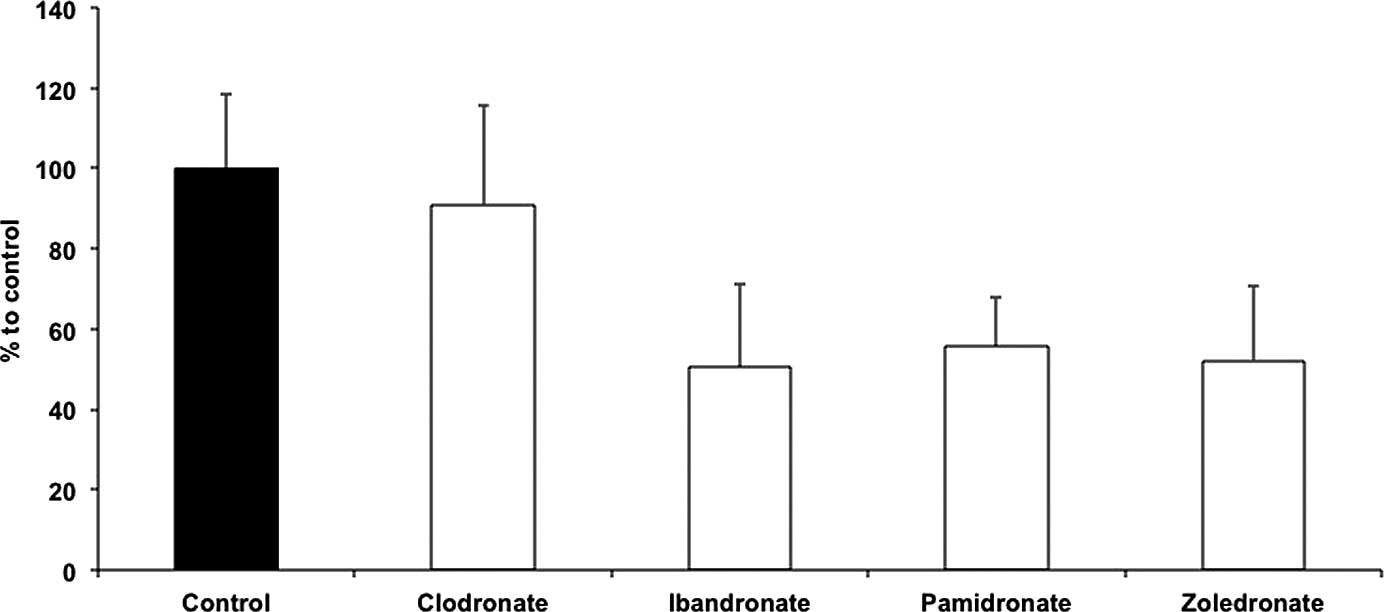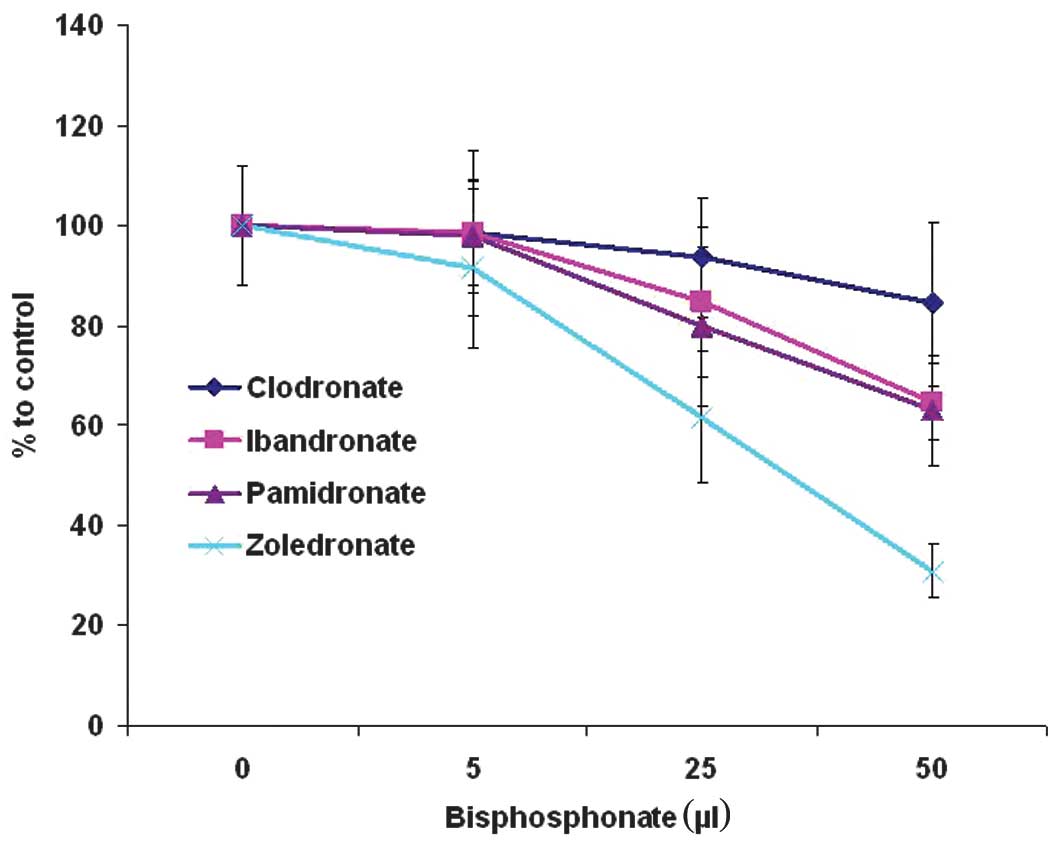|
1
|
Neville-Webbe HL and Coleman RE:
Bisphosphonates and RANK ligand inhibitors for the treatment and
prevention of metastatic bone disease. Eur J Cancer. 46:1211–1222.
2010. View Article : Google Scholar : PubMed/NCBI
|
|
2
|
Coleman RE: Metastatic bone disease:
clinical features, pathophysiology and treatment strategies. Cancer
Treat Rev. 27:165–176. 2001. View Article : Google Scholar : PubMed/NCBI
|
|
3
|
Rogers MJ: New insights into the molecular
mechanisms of action of bisphosphonates. Curr Pharm Des.
9:2643–2658. 2003. View Article : Google Scholar : PubMed/NCBI
|
|
4
|
Rogers MJ, Gordon S, Benford HL, et al:
Cellular and molecular mechanisms of action of bisphosphonates.
Cancer. 88:2961–2978. 2000. View Article : Google Scholar : PubMed/NCBI
|
|
5
|
Dunford JE, Thompson K, Coxon FP, et al:
Structure-activity relationships for inhibition of farnesyl
diphosphate synthase in vitro and inhibition of bone resorption in
vivo by nitrogen-containing bisphosphonates. J Pharmacol Exp Ther.
296:235–242. 2001.
|
|
6
|
Fisher JE, Rogers MJ, Halasy JM, et al:
Alendronate mechanism of action: geranylgeraniol, an intermediate
in the mevalonate pathway, prevents inhibition of osteoclast
formation, bone resorption, and kinase activation in vitro. Proc
Natl Acad Sci USA. 96:133–138. 1999. View Article : Google Scholar : PubMed/NCBI
|
|
7
|
Santini D, Vincenzi B, Avvisati G, et al:
Pamidronate induces modifications of circulating angiogenetic
factors in cancer patients. Clin Cancer Res. 8:1080–1084.
2002.PubMed/NCBI
|
|
8
|
Yamada J, Tsuno NH, Kitayama J, et al:
Anti-angiogenic property of zoledronic acid by inhibition of
endothelial progenitor cell differentiation. J Surg Res.
151:115–120. 2009. View Article : Google Scholar : PubMed/NCBI
|
|
9
|
Ziebart T, Pabst A, Klein MO, et al:
Bisphosphonates: restrictions for vasculogenesis and angiogenesis:
inhibition of cell function of endothelial progenitor cells and
mature endothelial cells in vitro. Clin Oral Investig. 15:105–111.
2011. View Article : Google Scholar : PubMed/NCBI
|
|
10
|
Kerbel RS: Tumor angiogenesis. N Engl J
Med. 358:2039–2049. 2008. View Article : Google Scholar : PubMed/NCBI
|
|
11
|
Rak JW, St Croix BD and Kerbel RS:
Consequences of angiogenesis for tumor progression, metastasis and
cancer therapy. Anticancer Drugs. 6:3–18. 1995. View Article : Google Scholar : PubMed/NCBI
|
|
12
|
Asahara T, Masuda H, Takahashi T, et al:
Bone marrow origin of endothelial progenitor cells responsible for
postnatal vasculogenesis in physiological and pathological
neovascularization. Circ Res. 85:221–228. 1999. View Article : Google Scholar
|
|
13
|
Asahara T, Murohara T, Sullivan A, et al:
Isolation of putative progenitor endothelial cells for
angiogenesis. Science. 275:964–967. 1997. View Article : Google Scholar : PubMed/NCBI
|
|
14
|
Ziebart T, Yoon CH, Trepels T, et al:
Sustained persistence of transplanted proangiogenic cells
contributes to neovascularization and cardiac function after
ischemia. Circ Res. 103:1327–1334. 2008. View Article : Google Scholar : PubMed/NCBI
|
|
15
|
Urbich C, Heeschen C, Aicher A, et al:
Cathepsin L is required for endothelial progenitor cell-induced
neovascularization. Nat Med. 11:206–213. 2005. View Article : Google Scholar : PubMed/NCBI
|
|
16
|
Efstathiou E, Bozas G, Kostakopoulos A, et
al: Combination of docetaxel, estramustine phosphate, and
zoledronic acid in androgen-independent metastatic prostate cancer:
efficacy, safety, and clinical benefit assessment. Urology.
65:126–130. 2005. View Article : Google Scholar
|
|
17
|
Bertelli G, Heouaine A, Arena G, et al:
Weekly docetaxel and zoledronic acid every 4 weeks in
hormone-refractory prostate cancer patients. Cancer Chemother
Pharmacol. 57:46–51. 2006. View Article : Google Scholar : PubMed/NCBI
|
|
18
|
Vogt U, Bielawski KP, Bosse U and
Schlotter CM: Breast tumour growth inhibition in vitro
through the combination of
cyclophosphamide/metotrexate/5-fluorouracil,
epirubicin/cyclophosphamide, epirubicin/paclitaxel, and
epirubicin/docetaxel with the bisphosphonates ibandronate and
zoledronic acid. Oncol Rep. 12:1109–1114. 2004.
|
|
19
|
Wood J, Bonjean K, Ruetz S, et al: Novel
antiangiogenic effects of the bisphosphonate compound zoledronic
acid. J Pharmacol Exp Ther. 302:1055–1061. 2002. View Article : Google Scholar : PubMed/NCBI
|
|
20
|
Janic B and Arbab AS: The role and
therapeutic potential of endothelial progenitor cells in tumor
neovascularization. Sci World J. 10:1088–1099. 2010. View Article : Google Scholar : PubMed/NCBI
|
|
21
|
De Falco E, Porcelli D, Torella AR, et al:
SDF-1 involvement in endothelial phenotype and ischemia-induced
recruitment of bone marrow progenitor cells. Blood. 104:3472–3482.
2004.PubMed/NCBI
|
|
22
|
Brunner M, Thurnher D, Heiduschka G, Grasl
M, Brostjan C and Erovic BM: Elevated levels of circulating
endothelial progenitor cells in head and neck cancer patients. J
Surg Oncol. 98:545–550. 2008. View Article : Google Scholar : PubMed/NCBI
|
|
23
|
Aicher A, Zeiher AM and Dimmeler S:
Mobilizing endothelial progenitor cells. Hypertension. 45:321–325.
2005. View Article : Google Scholar : PubMed/NCBI
|
|
24
|
Hristov M, Erl W and Weber PC: Endothelial
progenitor cells: mobilization, differentiation, and homing.
Arterioscler Thromb Vasc Biol. 23:1185–1189. 2003. View Article : Google Scholar : PubMed/NCBI
|
|
25
|
Frith JC, Monkkonen J, Blackburn GM,
Russell RG and Rogers MJ: Clodronate and liposome-encapsulated
clodronate are metabolized to a toxic ATP analog, adenosine
5′-(beta, gamma-dichloromethylene) triphosphate, by mammalian cells
in vitro. J Bone Miner Res. 12:1358–1367. 1997.PubMed/NCBI
|
|
26
|
Nogawa M, Yuasa T, Kimura S, et al:
Zoledronic acid mediates Ras-independent growth inhibition of
prostate cancer cells. Oncol Res. 15:1–9. 2005.PubMed/NCBI
|
|
27
|
Bifulco M: Role of the isoprenoid pathway
in ras transforming activity, cytoskeleton organization, cell
proliferation and apoptosis. Life Sci. 77:1740–1749. 2005.
View Article : Google Scholar : PubMed/NCBI
|
|
28
|
Crick DC, Andres DA and Waechter CJ: Novel
salvage pathway utilizing farnesol and geranylgeraniol for protein
isoprenylation. Biochem Biophys Res Commun. 237:483–487. 1997.
View Article : Google Scholar : PubMed/NCBI
|
















